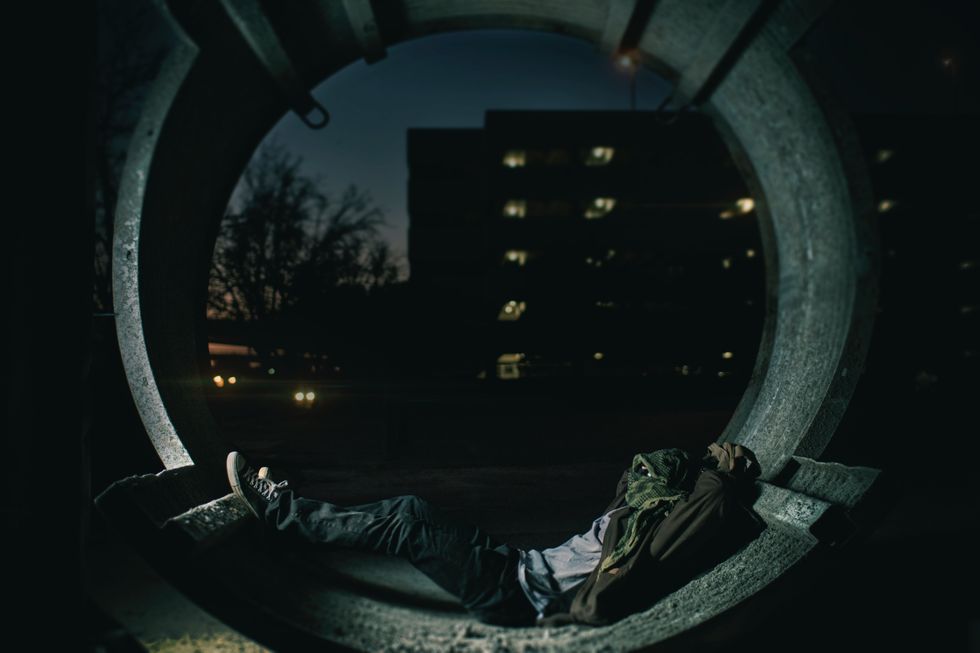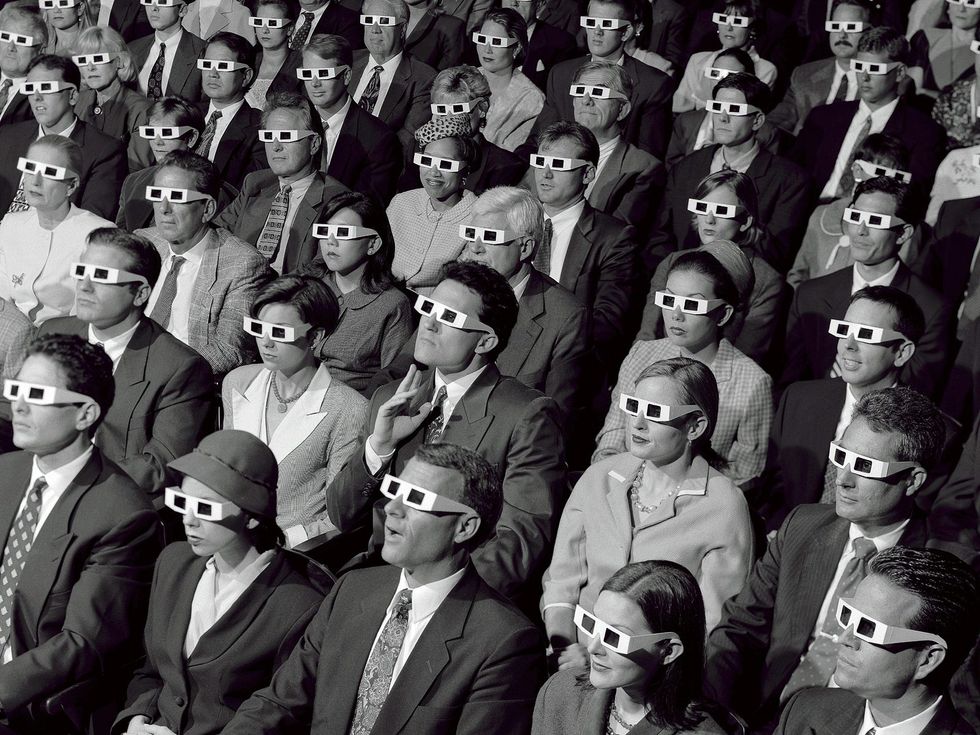Homelessness has been and will likely continue to be a timeless issue in American society, and in fact any capitalist society. But what is today's approach to homelessness? And which ideologies influence it? How is it seen? The sociocultural trend of present day America is that of neoliberalism. Homelessness, in the age of neoliberalism, is presented with a wider range of different challenges; the issue is still there, but the way it is viewed has changed in quite an interesting way. To understand why neoliberalism poses a different kind of threat to the homeless, first you must understand the inherent tension that exists in the relationship between societies, as defined by neoliberalism, and homelessness.
In his essay, "Comments on the Society of the Spectacle," Guy Debord explains:
"The fusion of State and economy is the most evident trend of the century; it has at the very least become the motor of the most recent economic development. The defensive and offensive pact concluded between these two powers, the economy and the State, has assured them of the greatest common advantages in every field: each may be said to own the other...This union has also proved to be extremely favorable to the development of spectacular domination, which, precisely, from its formation, hasn't been anything else."
This fusion of the state and the economy is the basis of a neoliberal society. The purpose of the state, as with everything with it, becomes simply that of capital, and in such a society homelessness plays an uncomfortable role. The position of a homeless person in society is that of non-relation with the society. Society is the participation in capital, and a homeless person is someone who is unable to participate in capital, and in turn, in society. In a sense, the homeless are ‘dead’ since the state exercises the following: “the power to decide the point at which life ceases to be politically relevant…in modern biopolitics, sovereign in he who decides on the value or nonvalue of life as such.”
The concept comes down to that of public space, which is the capacity in which homeless people tend to exist. In a neoliberal society, space and time are commodified, and the issue with homelessness is that it places a hindrance or blemish on this. If space is a commodity, then the existence of a homeless person in that space is simply bad for business. Public space is seen as a transient location, a place used as a means for commodity exchange and participation in a capitalist society. Therefore, when a homeless person uses it as an ‘end,’ or a home, it creates tension.
Author Randall Amster delves into this concept in his book, "Lost in Space." He states,
"In this era of privatization in downtown spaces, rights of the 'public' to use space are being supplanted by rights of the 'owners'; to exclude based on business interest. Often these contradictory practices revolve around removing aesthetically displeasing bodies to promote a tourist-friendly consumer zone."
Addressing the problem is a different matter, but this is about how the ‘problem,’ in this case homeless people, interacts with society, or rather how society views them. Or in this case how society does not, as the homeless are the ‘socially dead.’ They are essentially made invisible by being driven to other locations, because in this sense they interfere with the true purpose of society, which is to engage in capital. This kind of spatial exclusion of the homeless, in places marked simply for commodity exchange and participation in capital, is visually and legislatively evident most primarily in urban cities. The fact of the matter is that if you are not participating in capital then you become no longer socially worthy of any kind of importance.
This is an ideology so deeply embedded that it is seen being pushed even by homeless individuals themselves. When you think about homeless people in the streets holding up signs that say things like ‘will work for food’ or ‘vet needs work,’ the idea being ameliorated is that to be worthy of food, something you need for survival, so in turn life itself, you must prove that you are deserving enough and cooperative enough to re-engage in some form of capital. This is truly the exemplification of the state of the homeless person in a neoliberal society. But this being put aside, what is done when these individuals that are aesthetically displeasing disrupt the proceedings of capital and commodity exchange? They are simply removed.
In Dawn L. Rothe and Victoria E. Collins' essay, "The Integrated Spectacle: Neoliberalism and the Socially Dead," they further discuss the issues at hand for the homeless:
"The homeless are forced to become part of a dark underbelly of society, silenced and removed from the visual experience of the rest of us who gratefully pretend that homelessness does not exist. Nowhere is the spatial exclusion of homeless bodies more prominent than in the urban landscape of the city. As representatives of poverty, the homeless are a visible reminder of the failings of capitalism, social inequality, and the 'socially dead,” processes that subject them to harsh regulatory controls directly commissioned by an increasingly carceral state.
Abundant examples exist, from the criminalization of New York City ‘squeegee’ operators in the era of law and order policing (Parenti 2008), to park exclusion laws, off-limits orders, increased application of trespassing, loitering, and vagrancy laws, as well as architectural designs that restrict access to certain spaces (Carr and Hunter 2008). Often framed as efforts to preserve public space and/or restructure urban landscapes (DeVerteuil, May, and von Mahs 2009), such initiatives serve to undermine the humanity of those who are targeted, in a further exercise of biopolitics and biopower.”
Therefore, the urban city solution to the issue of homelessness is to make it invisible, make it somebody else’s problem. This view of the homeless as a scourge on neighborhoods and society isn’t only held by stores or companies or industries, but due to the neoliberalization of society as a whole, at an individual level this often is how the homeless are viewed. Through these laws, it essentially becomes illegal to be homeless.



 all stars lol GIF by Lifetime
all stars lol GIF by Lifetime two women talking while looking at laptop computerPhoto by
two women talking while looking at laptop computerPhoto by  shallow focus photography of two boys doing wacky facesPhoto by
shallow focus photography of two boys doing wacky facesPhoto by  happy birthday balloons with happy birthday textPhoto by
happy birthday balloons with happy birthday textPhoto by  itty-bitty living space." | The Genie shows Aladdin how… | Flickr
itty-bitty living space." | The Genie shows Aladdin how… | Flickr shallow focus photography of dog and catPhoto by
shallow focus photography of dog and catPhoto by  yellow Volkswagen van on roadPhoto by
yellow Volkswagen van on roadPhoto by  orange i have a crush on you neon light signagePhoto by
orange i have a crush on you neon light signagePhoto by  5 Tattoos Artist That Will Make You Want A Tattoo
5 Tattoos Artist That Will Make You Want A Tattoo woman biting pencil while sitting on chair in front of computer during daytimePhoto by
woman biting pencil while sitting on chair in front of computer during daytimePhoto by  a scrabbled wooden block spelling the word prizePhoto by
a scrabbled wooden block spelling the word prizePhoto by 
 StableDiffusion
StableDiffusion
 StableDiffusion
StableDiffusion
 StableDiffusion
StableDiffusion

 women sitting on rock near body of waterPhoto by
women sitting on rock near body of waterPhoto by 
 Photo by
Photo by  Photo by
Photo by  Photo by
Photo by  Photo by
Photo by  Photo by
Photo by  Photo by
Photo by  Photo by
Photo by  Photo by
Photo by  Photo by
Photo by  Photo by
Photo by 









